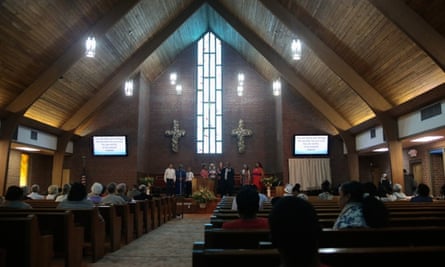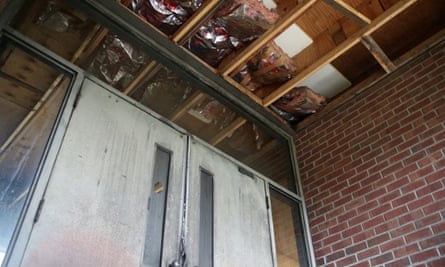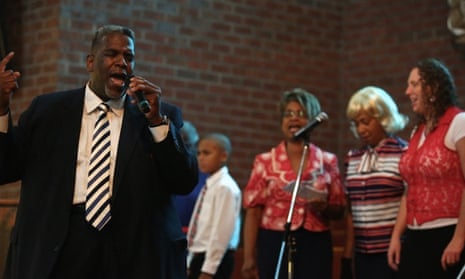A few minutes after 11am on Independence Day, College Hill Seventh-Day Adventist church pastor Cleveland Hodby III stands behind the wooden pulpit of his 33-year-old house of worship, which stands atop a kudzu-covered hill overlooking the heart of downtown Knoxville.
Dressed in his Saturday finest, the heavy-set preacher leads nearly 100 men and women through a two-hour service filled with gospel hymns and a spirited freedom-themed sermon. But before he begins, Hodby expresses excitement about having a place to worship. That sentiment, an afterthought on most weeks, is now necessary after someone torched part of the church on 21 June.
“It was stunning,” says Hodby, recalling the night his church was intentionally set on fire. “I wasn’t prepared. I realized that we’re vulnerable.”
College Hill, which experienced tens of thousands of dollars in damage but avoided total destruction, was the first of the latest string of church burnings across the American south. At least eight predominantly black churches have gone up in flames since 21-year-old white gunman Dylann Roof is said by authorities to have shot to death nine black men and women inside a historic church in Charleston, South Carolina, on 17 June.
Investigators, who have confirmed arson as the cause of at least three of the black church fires, have not yet found any to be hate crimes. But the church burnings, which have also happened in states like Georgia, North Carolina, and South Carolina, have occurred amid tremendous pressure for the Confederate flag to be removed from prominent public facilities, much to the ire of some southerners who consider the flag a part of their heritage.

Southern black churches are hardly strangers to racially motivated attacks. Given a history that dates back to the early 19th century, Hodby recognizes what happened to his 280-member church isn’t much different from the tragic 1963 16th Street Baptist Church bombing in Birmingham, Alabama, or the still-unsolved 1996 Inner City Church arson in Knoxville. Unwilling to let history repeat itself, he’s taking extra safety precautions as College Hill braces for the worst.
“I don’t have proof it was a hate crime,” Hodby says. “But you know a burnt-down church really leaves no sign that says ‘we hate you’. It’s a burnt church that says ‘we hate you’.”
Over a five-year period ending in 2011, the National Fire Protection Association found arsonists each year had set fire to about 280 houses of worship from all faiths.
The report also shows arson to responsible for about 16% of all church fires.
Valarie Cooper, associate professor of black church studies at Duke University, says church burnings can be particularly harmful to religious communities given the lack of closure in what are often anonymous attacks that go unsolved.
“It’s often difficult to find the perpetrators,” Cooper says. “So arsons are underreported and under-investigated. If churches are insured, what’s the difference?”
The College Hill fire destroyed the church’s side metal doors, soffit, ceiling insulation, and carpet, all of which will require an estimated $50,000 in repairs. In the parking lot, arsonists also torched a used Chevy Astro van recently acquired for community outreach events. Church leaders expect the insurance company to cover the damages.
Marshall Henley, a church elder who’s attended College Hill’s services for more than three decades, says arsonists ignited piles of straw that were stuffed inside wire cages used to grow tomatoes in the children’s garden at the church. He says the side entrance is located on an isolated part of the building, one that’s not visible to potential passersby.
“We don’t really know what happened,” Henley says. “The more I think about it, the more I think may have been hate-related and a racial terrorist kind of thing.”
Gilda Hendricks, a longtime pianist at the church, says the arsonists also spread bags of soil outside two other entrances. She thinks they likely had mistaken the soil for mulch, which can be extremely combustible, and made an error that prevented the damage from being far worse.
“The smoke went in through the crack of the door and started the fire alarm,” Hendricks says. “If the smoke had not gone in, we would not be standing right here. The church would’ve been gone. It’s a blessing. It wasn’t luck.”
Hodby, who has forgiven the arsonists for their actions, says the tragedy has unexpectedly led to an overwhelming amount of support from people of different races and religious denominations. Two St Louis-based rabbis recently informed the pastor their synagogues had raised more than $75,000 for the burnt churches, which could help College Hill pay for the damages or new security improvements.
Inside the Knoxville sanctuary on 4 July, white church members at the nearby Tennessee Valley Unitarian Universalist Church, inside which two people were shot to death in 2008, came and prayed in solidarity with the black Seventh Day Adventists.

“On the Fourth of July, we should embrace our freedoms,” Tennessee Valley Unitarian Universalist church pastor Chris Buice told College Hill church members. “Those freedoms are our freedom to worship and our freedom from fear.”
Though College Hill’s services have continued as planned, Hodby says, his congregation is now on guard for future attacks. According to Hodby, some churchgoers have asked for the installation of metal detectors to ensure suspects don’t “come back and finish what they started”. Others have asked him for permission to bring their own guns to their services.
For now, he’s stopped short of letting guns into the house of worship. But he’s pledged to soon install video cameras, increase security personnel, and properly train church staff on how to react to future attacks. At several upcoming weekly services, Hodby plans to have his entire congregation walk through church safety protocol, partake in fire drills, and learn other safety precautions.
“You can’t go back,” Hodby says. “Who would’ve ever thunk it that a church has to respond to these [shootings] and burnings? It’s the ultimate act of cowardice. It’s going to be a new normal.”

Comments (…)
Sign in or create your Guardian account to join the discussion